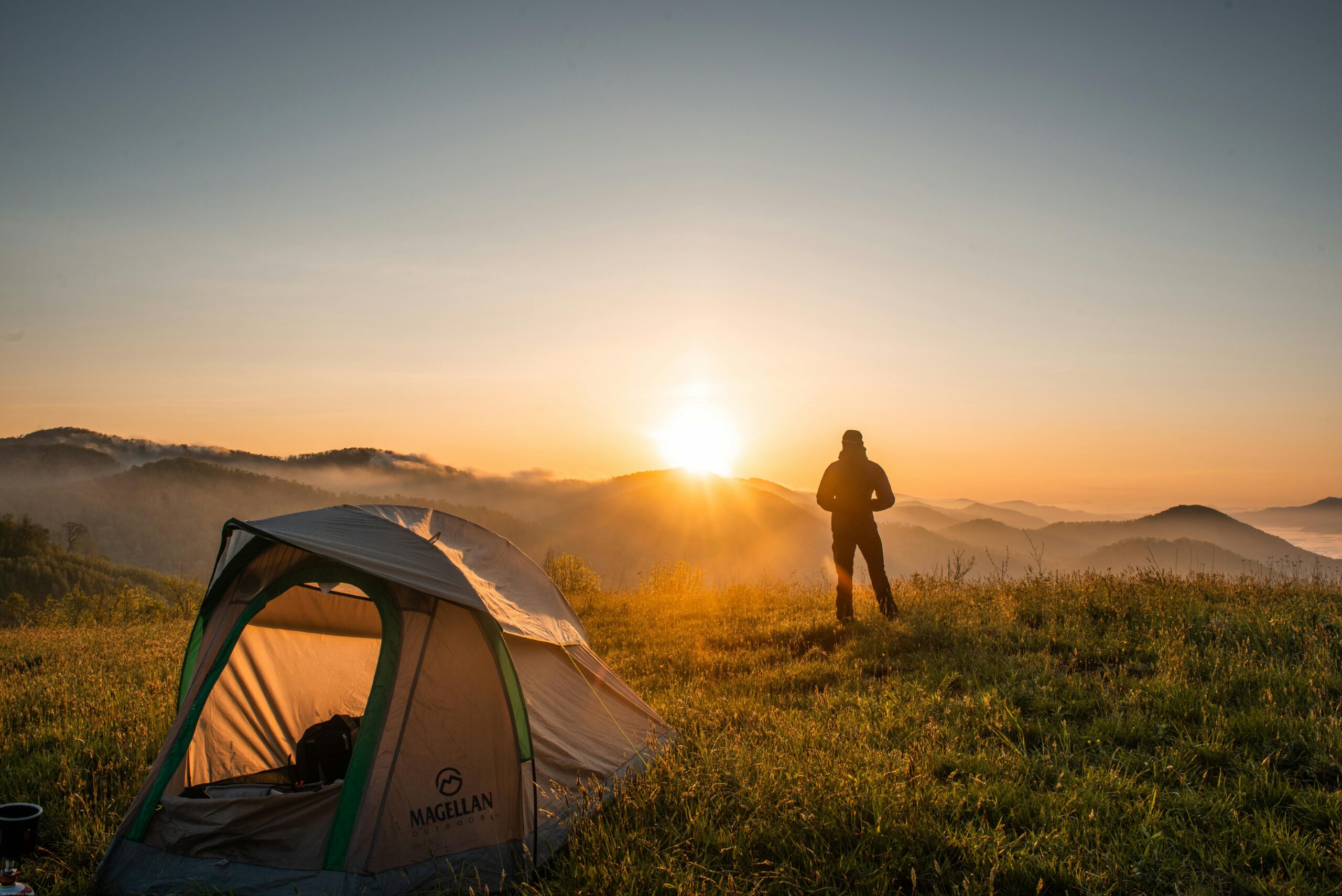Article written by Denver therapist, Molly Ward
Living in Colorado, we are so incredibly lucky to have such great access to nature and the outdoors.
Growing up, our yearly camping trips as a family were something I looked forward to. I always came back feeling refreshed and grounded into myself.
With such a positive impact on my life, I started thinking about the neuroscience of camping and its impact on the brain.
Turns out camping isn’t just a way to “get away from it all”, but a powerful intervention to support with reviving our brains and restoring mental health.
Being Outdoors Supports Mental Wellbeing
First and foremost, we know that any time spent in the outdoors has profound positive impacts on our mental health.
Extended time in natural elements can boost those benefits even further.
Research shows that exposure to fresh air and nature can reduce cortisol levels (our body’s stress hormone), lower blood pressure, and can activate our parasympathetic nervous system, which allows us to “rest and digest”.
These environments also increase production of serotonin, a mood boosting hormone, and dopamine, which helps us feel pleasure and reward.
Dopamine Reset in Nature Supports Resilience
We are all collectively experiencing dopamine dysregulation in our society.
We are constantly inundated with artificial stimulation, leaving our reward systems constantly seeking, and never satisfied.
Camping offers a complete dopamine reset.
Instead of the quick, superficial spikes of dopamine that we get throughout our days, camping supports a healthy dopamine production.
Setting up camp, building a fire, or making a meal outdoors are all sustainable dopamine releases that can actually strengthen your brain’s reward pathways rather than harming them.
Your brain can literally grow healthier pathways when camping, rewiring itself for resilience and an overall healthy well-being.
Freedom from Decision Fatigue Supports Mental Clarity
Though camping may require planning beforehand, there is a dramatic reduction in daily decision-making once you are there.
In our face-paced lives, we are constantly presented with micro-decisions to make throughout our days.
What to wear, what to eat, when to fit in exercise, when to go grocery shopping, which mess to clean, etc.
For anyone, the constant decision-making leaves us mentally exhausted.
For those with ADHD, anxiety, depression, or other mental health concerns, this decision making marathon can be detrimental.
When camping, choices become beautifully simple.
Wake up when it feels right to you, eat when you want to eat, read when you want to read, and so on.
Your job for the most part is to stay warm, nourished and safe. This allows the decision-making part of our brain to finally rest and recharge.
When our prefrontal cortex gets to rest, we have newfound clarity, increased decision-making capacity and stress levels diminish.
Mental Health Benefits of Completing Meaningful Camping Tasks
There’s something deeply satisfying about completing the small tasks that are necessary for camping survival.
It feels as though each task can have a big reward – starting a fire for warmth, making meals, creating a warm sleeping space, fighting off bugs.
These tasks tap into a deeper part of our brain that helps provide a sense of purpose and accomplishment that’s often missing from our usual lives.
Research also shows that engaging in these simple tasks with big reward can help heal damaged neural pathways.
Try Our Intuitive Eating In Nature
With far less stimulation, camping creates an opportunity to reconnect with our bodies and its innate signals.
This connection creates more opportunity to tune into our natural hunger and satiety cues, something that can be hard to do in a world of diet culture and stress inducing triggers.
It allows us to rebuild trust with our own internal guidance system.
Our world profits off self-doubt, and reconnecting with your intuitive wisdom is a way to fight back and support with healing.
Away From Technology: Increase Mental Clarity
The opportunity to step away from screens isn’t just refreshing, it’s becoming essential for our mental wellbeing.
Our attachment to technology keeps our brains constantly hyper-aroused and depletes our brain’s energy.
When we step away from technology, the things we turn our attention to can be restful, allowing our mental resources to regenerate.
This allows our brain to have more space to process emotions and generate insights, rather than being constantly interrupted.
Returning from camping, people often report greater insights, breakthroughs, new ideas, and in general more creativity and energy for problem solving, largely due to this break from technology.
Movement as Medicine for Your Mental Wellbeing
Though there can be so much rest involved in camping, movement is inevitably incorporated into your day and also provides mental health benefits.
Especially if you live in Colorado where simply getting your flannel from the tent will make you feel out of breath!
With this purposeful, not obligatory movement woven into your day, dopamine and serotonin increase, but also movement also promotes neuroplasticity.
Increased neuroplasticity helps your brain form new connections, overall creating more ease in your life and improved mental wellbeing.
Mindfulness Can Be Effortless In Nature
Camping is inherently mindful. With the natural environment rich in sensory experiences, it’s hard for our attention to not be organically drawn to the present moment.
With crackling fires, singing birds, sun shining, expansive views, our brain doesn’t have to work to be mindful.
With more of these mindful moments built in, rumination and worry can decrease, we can feel less reactive, there can be an increase our attention span, and neuroplasticity continues to increase as does mental clarity.
Combine movement and mindfulness, take a nature walk and take note of all you notice along the way.
Breathe in the smells of nature, feel the breeze on your face, notice the wildflowers and animals.
Healthy Sleeping Patterns Support Mental Wellbeing
Though it can be hard sleeping in a new environment, outside the comfort of your bed, surrounded by foreign sounds, one of camping’s most healing gifts can be the opportunity to sync with our natural circadian rhythms.
In our world, most of us are sleep deprived and disconnected from our biological clocks.
Rising with the sun and sleeping with darkness is profoundly restorative, leading to improved sleep quality and overall better sleep.
As we know on a foundational level, quality sleep is one of the most powerful supports of mental health and emotional resilience – and camping provides an avenue to get that.
Reconnection with Your Self Through Nature
With all of these above listed benefits, camping provides a unique opportunity to connect with your self and your values.
Increased mindfulness, neuroplasticity, and decreased decision fatigue give us energy to reflect on our priorities and what truly matters, allowing us to make decisions that feel in line with our authentic selves.
Bringing the Benefits of Nature Home
Though camping can have a profound impact on your mental health, I know that camping is not for everyone, respectfully.
The good news is that there are things you can do to access some of the neurological benefits without the camping trip.
Here are nice things you can take from camping and integrate into your life:
Get outside regularly:
Spending time outside, just 15-30 minutes, can help improve mood and overall mental health. Once you’re outside, try and spend time trying to look for the natural elements, even if you’re in a city.
Being able to see these natural elements, like the grass in the park or the trees in your neighborhood, help us connect with nature and get our nature therapy even when we can’t be in it.
Practice digital detoxes:
Schedule regular digital detoxes to allow your brain the same rest that you get from the outdoor experience of camping.
Additionally, you can also create spaces in your home that can be technology free zones, like at the dinner table or when in bed.
Prioritize natural sleep patterns:
Instead of doom scrolling for hours on your bright phone before bed, try and spend some time in dim lighting, limit screen times, and do your best to stick to a consistent sleep schedule.
Engage in hands-on activities:
Cooking, gardening or yard work, or building something are all activities that produce tangible results the same way completing tasks when camping do.
Create moments of mindfulness:
Find ways to incorporate mindfulness, whether its tuning into your senses, being present during an outdoor adventure, or practicing meditation.
Regular mindfulness practice can help replicate the present moment awareness that comes from the camp experience.
If you were on the fence about the benefits of camping, the evidence is clear.
Camping is the coping skill of summer (and maybe even fall!).
Camping trips and the related outdoor experiences help create more emotional resilience, improve mood, improve physical health, and overall well-being.
It’s one of the best acts of care that you can do for yourself.
If you are looking for more support for your mental health, contact us today to get started with one of our clinicians.
***

Denver Therapist, Molly Ward
Molly Ward is a Licensed Clinical Social Worker, Licensed Addictions Counselor, and Certified Intuitive Eating Clinician who practices therapy at Denver Metro Counseling. Molly is an avid camper and experiences first-hand the benefits of being in nature on her mental health.
Molly brings a lightness and compassion to her work with individuals and families across the ages. She integrates her learning in accessible ways that clients can grasp.
Molly provides therapy for people who want to explore patterns of generational trauma, family conflict, unhealthy ways of coping, anxiety, depression, ADHD and more.
If you’re looking for a clinician who blends clinical knowings with authenticity, compassion, and humor, she may be the right fit.
Book a session with Molly today.

